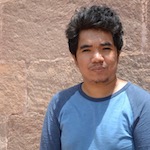FROM HUNYANGO MAN ANG TAO (EVEN IF HUMANS ARE CHAMELEONS)
Translated from Filipino
A tiny bottle was born in a sweltering factory. He was wrapped in a package, given a name, then placed in a box with his fellow newborns. All of them were brought to stores all over the city, arranged in a cold room where they await being purchased. The bottle wonders why his parents would just abandon him, and withhold their care and affection. They pushed him toward a clear glass that contained a strange world. The refrigerator door opens and a hand reaches for the bottle. Placed in front of a cashier who weighed its value. The man takes out ten pesos. He takes the bottle and outside quickly gulps down its contents. The man then throws him onto the open sea where he floats not knowing where the current would take him the next moment or the next day. Noon came and exposed the bottle to its scorching light. The bottle tried to weep but his mouth had already begun to dissolve, to disintegrate into tiny pieces. Then his body. Finally his head. His tiny parts dispersed into the water. So tiny that fish failed to see him. A tiny one came by. Opened its mouth and ingested him. The fish didn’t know. It just went on to eat whatever bit it could from the sea. A day into playing with his fish friends a huge net descended upon them. They were all hauled unto a ship. Brought to a factory where they were unloaded, moved around, and rolled over again and again. After going through a number of hands, its head wad removed, the rest of him canned. Wrapped in a package, too, and given a name. The cans were brought to the grocery store, then picked up by someone cooking sautéed sardines for some workers’ lunch. But that day no one wanted the dish so the cook took it home for their kids. The kids didn’t want sardines, too, it was always fish day in and day out. This kid got a good scolding. The rest of the brood cried. The sardines were put in a plastic bag and thrown outside. Another group of kids was waiting by the garbage bin. By now they knew what time the cook would throw something out. They opened the discarded plastic bag. Sardines—what a lucky day. Quickly they dug in but the eldest seized the fish and moved away from the frenzy. He devoured the fish he held in his hands. It remained in his stomach for years until he felt hunger anew. His companions had been frolicking by the shore when he, now a young man, felt a pang in his midsection. A sharp pain where he put the sardines. The others, swimming farther away from him, didn’t notice. He tried to come closer to them so they’d hear his cries for help. But that day the waves had been heavy, leaden. They dislodged his feet from the seafloor. He stumbled. Set adrift beyond what was visible from the shore. In this state the sun found him. The sun saw how his body began to disintegrate, broken apart by the water into tiny pieces. Broken apart until it was as small as drizzle. From the tiny breaks in the flesh emerged the plastic and their siblings.

Janssen Cunanan lives in Makati City, Philippines. He is currently a member of AUX (Artists in BPO Unite for Social Change), a cultural organization that utilizes art in fighting for labor rights and advancing national democracy. His works appeared in Plural: Online Prose Journal, ALPAS Journal, and SmokeLong Quarterly.

Glenn Diaz‘s first book The Quiet Ones (Ateneo Press, 2017) is set in the Philippine call center industry. He lives in Manila.

 BACK TO ISSUE
BACK TO ISSUE